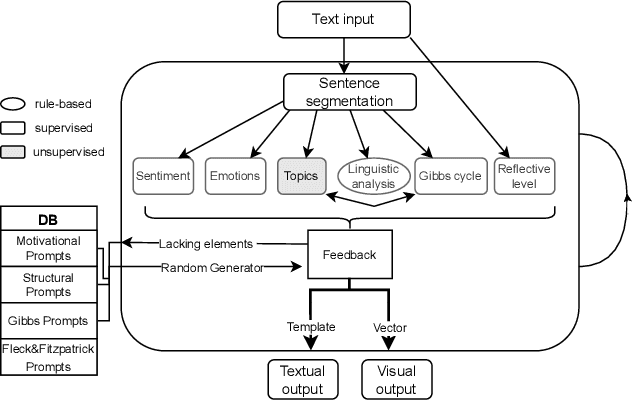Ralf Romeike
PapagAI:Automated Feedback for Reflective Essays
Jul 10, 2023



Abstract:Written reflective practice is a regular exercise pre-service teachers perform during their higher education. Usually, their lecturers are expected to provide individual feedback, which can be a challenging task to perform on a regular basis. In this paper, we present the first open-source automated feedback tool based on didactic theory and implemented as a hybrid AI system. We describe the components and discuss the advantages and disadvantages of our system compared to the state-of-art generative large language models. The main objective of our work is to enable better learning outcomes for students and to complement the teaching activities of lecturers.
Data, Trees, and Forests -- Decision Tree Learning in K-12 Education
May 10, 2023Abstract:As a consequence of the increasing influence of machine learning on our lives, everyone needs competencies to understand corresponding phenomena, but also to get involved in shaping our world and making informed decisions regarding the influences on our society. Therefore, in K-12 education, students need to learn about core ideas and principles of machine learning. However, for this target group, achieving all of the aforementioned goals presents an enormous challenge. To this end, we present a teaching concept that combines a playful and accessible unplugged approach focusing on conceptual understanding with empowering students to actively apply machine learning methods and reflect their influence on society, building upon decision tree learning.
What Students Can Learn About Artificial Intelligence -- Recommendations for K-12 Computing Education
May 10, 2023Abstract:Technological advances in the context of digital transformation are the basis for rapid developments in the field of artificial intelligence (AI). Although AI is not a new topic in computer science (CS), recent developments are having an immense impact on everyday life and society. In consequence, everyone needs competencies to be able to adequately and competently analyze, discuss and help shape the impact, opportunities, and limits of artificial intelligence on their personal lives and our society. As a result, an increasing number of CS curricula are being extended to include the topic of AI. However, in order to integrate AI into existing CS curricula, what students can and should learn in the context of AI needs to be clarified. This has proven to be particularly difficult, considering that so far CS education research on central concepts and principles of AI lacks sufficient elaboration. Therefore, in this paper, we present a curriculum of learning objectives that addresses digital literacy and the societal perspective in particular. The learning objectives can be used to comprehensively design curricula, but also allow for analyzing current curricula and teaching materials and provide insights into the central concepts and corresponding competencies of AI.
 Add to Chrome
Add to Chrome Add to Firefox
Add to Firefox Add to Edge
Add to Edge